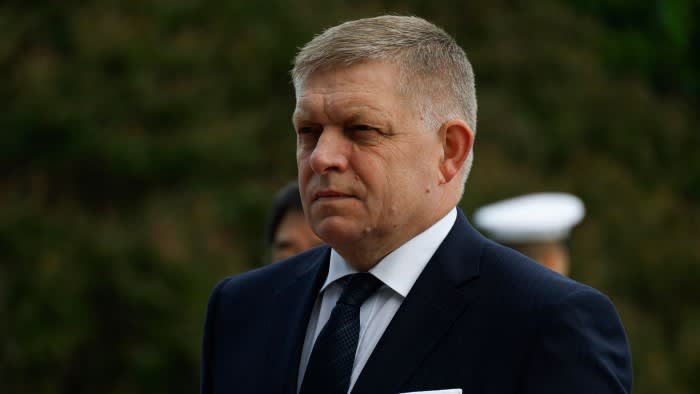Stay informed with free updates
Simply sign up to the EU energy myFT Digest — delivered directly to your inbox.
A warning by Ukraine that it could stop the transit of Russian gas to the EU has put pressure on Slovak Prime Minister Robert Fico, who must secure energy supplies even as he opposes Kyiv’s wish to join Nato.
Ahead of a meeting on Monday with Ukraine’s Prime Minister Denys Shmyhal, Fico called for “friendly gestures from Ukraine” as he seeks to safeguard gas imports.
The latest tensions over energy supplies were triggered by Kyiv announcing over the summer that it would not renew a transit contract between Naftogaz, Ukraine’s energy company, and Russia’s Gazprom that expires at the end of this year.
Fico has repeatedly made pro-Kremlin statements that have concerned Slovakia’s Nato allies. On Sunday, he said Slovakia would never agree to let Ukraine join the alliance while he was premier.
EU countries began to cut their dependency on Russian energy following its invasion of Ukraine in February 2022. Russian gas exports piped through Ukraine currently account for 5 per cent of the bloc’s total supply, but three member states continue to rely heavily on Russia for gas — Austria, Hungary and Slovakia.
“Europe will start the winter with its gas storage [units] pretty much full, but a cut-off by Ukraine would clearly create more of a problem for the landlocked countries of central Europe,” said Mario Holzner, director of the Vienna Institute for International Economic Studies, a think-tank.
“It’s also a risky decision for Ukraine,” Holzner said, adding that besides losing transit fees, a pipe closure could “even threaten Ukraine’s own gas supply if its pipeline infrastructure becomes a target for Russian attacks”.
While Fico wants to retain Russian gas supplies, Slovakia is among European countries trying to secure alternative supplies from Azerbaijan, even as some analysts warn Baku could then resell Russian gas disguised as its own.
Vladimír Šimoňák, Slovakia’s deputy minister for the economy who visited Azerbaijan last month, said it was “premature” to assess whether Azerbaijani gas could be imported by Slovakia next year, “but it’s technically feasible”.
Concerning Ukraine, Šimoňák told the Financial Times: “They [the Ukrainians] don’t want their enemy to make money . . . but they’re also making money from the transportation of gas and using gas coming from Russia. So this is sort of a bizarre thing: you have two countries at war doing a remarkable amount of business with each other.”
Fico, who survived an assassination attempt in May, is meeting Shmyhal in the Ukrainian border town of Uzhhorod. In January, Fico questioned Ukraine’s sovereignty only days before agreeing with Shmyhal to upgrade transport and electricity grid connections between their countries.
Last month, a Ukrainian government official said Kyiv’s status as a candidate for EU membership required granting other countries access to gas flows, while Ukraine also needed help from countries such as Slovakia to guarantee its electricity supplies.
The same person said a supply deal with Azerbaijan would allow Ukraine and EU importers to maintain greater distance from Moscow.
Last year, Fico pledged to halt military shipments to Ukraine. But since the prime minister began his fourth term a year ago, Slovakia has not sought to block EU funding packages to Ukraine, unlike Hungary, and Slovak defence companies have delivered weapons worth more than €100mn to Kyiv. “If we don’t produce, others will,” Fico said on Sunday.
Slovak education minister Tomáš Drucker defended his government’s criticism of EU sanctions on Russia and accused Germany and others of ignoring loopholes used by their own exporters to access the Russian market.
“I can only be in favour of sanctions if they work properly,” Drucker told the FT in an interview on the sidelines of a conference organised by think-tank Globsec. “How is it possible that there are western products and companies still operating in Russia? Germany is still allowing [its] technologies, cars, businesses in Russia.”
Fico will travel to Moscow next May for the anniversary of the end of the second world war. During Sunday’s commemoration of the 1944 battle of the Dukla Pass, on Slovakia’s border with Poland, he highlighted the Red Army’s achievements.
“Freedom came to Slovakia from the east, and absolutely nothing can be changed about this truth,” he said.


